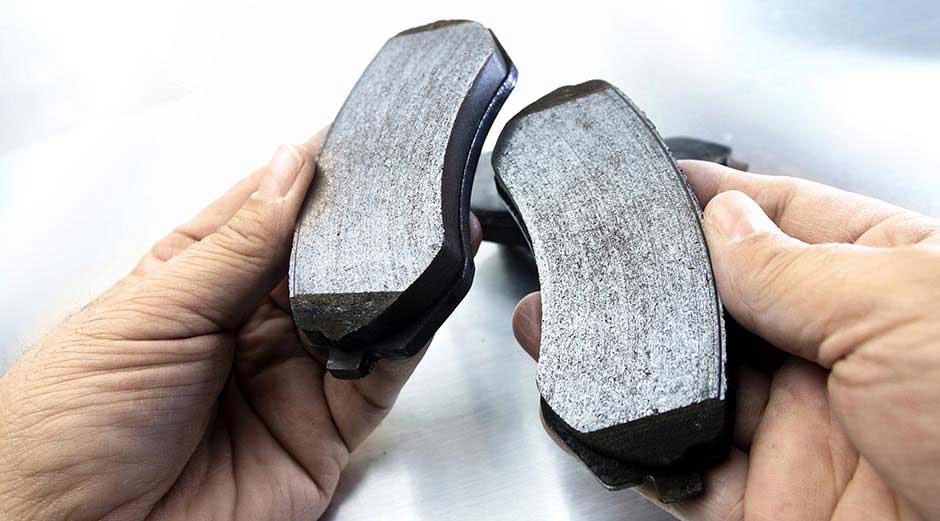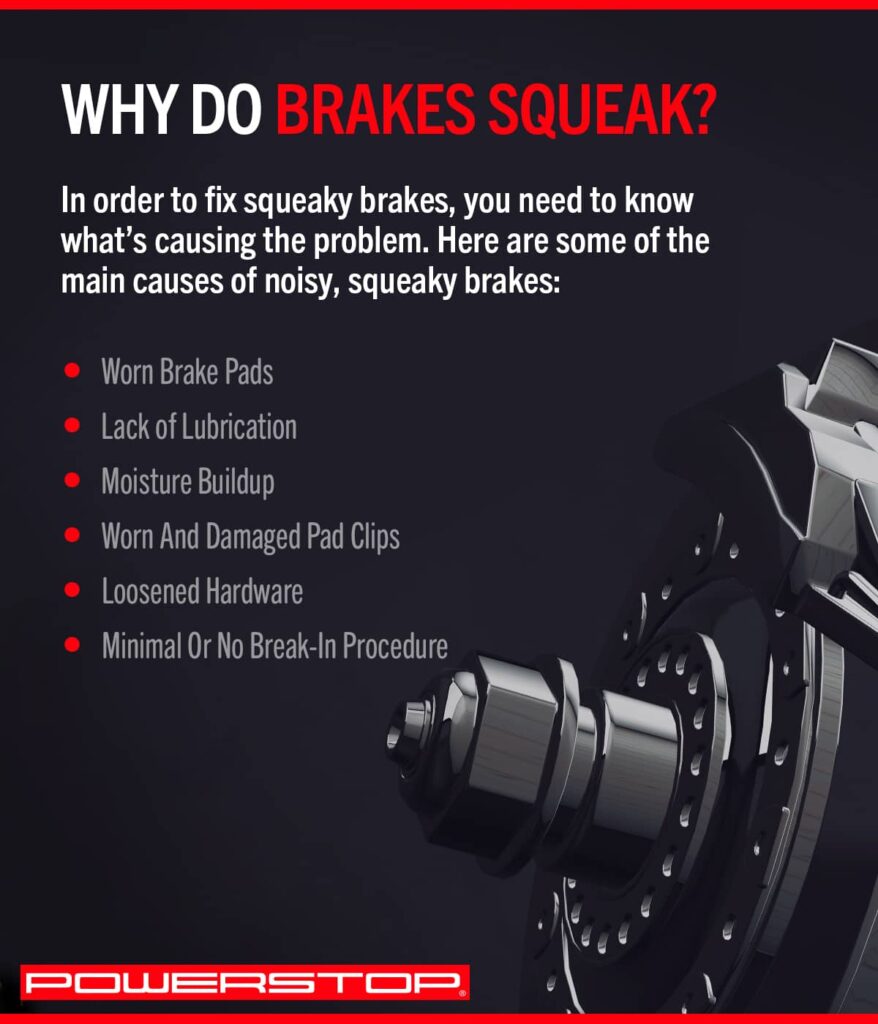
It can be unsettling to hear squeaks, squeals, and other noises coming from your brakes. While squeaky brakes are not always a cause for panic, it is important to determine the reason for the noise instead of ignoring it.

What Causes Brakes to Squeak?
In order to determine how to fix noisy, squeaky brakes, you must first identify the cause of your problem. Brakes can make noise for a number of different reasons. While it may be incredibly annoying, it does not always mean your braking components need to be replaced. However, if you hear metal-on-metal grinding, we recommend getting your brakes checked by a professional.
Below are common reasons why your brakes may be squeaking, squealing, or making other odd noises.
Lack of Lubrication
First of all, it is important to note that you should never put lubricant on the rotors or the friction side of the pads where they contact the rotors. This will harm your brakes and cause serious problems on the road. However, keeping certain parts of your braking system lubricated is critical to ensuring they operate properly. Incorrectly lubricated brakes can cause them to stop working entirely.
If you are dealing with a squeak or rough rubbing sound caused by the rust on a rotor being scraped off by the pads, check your braking system’s lubrication. In addition to applying lubricant to the edges of the brake pad that connect to the caliper, remove, clean, and lubricate the slide pins that are used to float the caliper in between the rotor. It is also recommended to put a small amount of lube on the backing plate of the brake pads. Noise can occur when these parts are not properly lubricated, indicating that the pins may have seized, causing the caliper to hang up, fail to ease pressure, and wear the brake pads down prematurely.
Minimal or No Break-In Procedure
Immediately following the installation of new brakes, it is crucial to properly break them in to ensure their performance. The break-in procedure is conducted to distribute an even layer of friction material from the brake pads onto the rotors. It is critical that this initial layer of friction material is distributed evenly.
Loosened Hardware
Braking systems comprise numerous parts, including rotors, pads, calipers, pins, clips, and hoses. When these components loosen, they can vibrate and generate a squeaking noise.
Worn Brake Pads
The mechanical-wear indicators that come with some brake pads serve one important purpose: To alert you when it’s time to change your brakes. When the pads wear down below their effective service life, the indicator makes contact with the brake rotor, creating a noticeable squeal whenever you apply the brakes. This typically occurs when the brake pads have approximately ⅛ – ¼” of material remaining. At this point, it’s time for new brake pads.
Worn and Damaged Pad Clips
Most modern brake pads are sold with pad clips included in the box. Pad clips are used to secure pads in their location on the caliper and minimize any of the pad’s movements or vibrations. Unfortunately, the new clips that come with pads are not always used when people change their brakes at home. Over time, spring-loaded brake hardware can lose its tension, causing squealing noises when the brakes are engaged. Since pad clips are made to only last the lifetime of the brake pads, it is important to change them every time you change your brakes. PowerStop includes all necessary hardware with our Brake Upgrade Kits.
Moisture Buildup
Brakes may squeak after a vehicle has been sitting out overnight. This is typically the normal result of moisture from rain, dew, or condensation collecting on the surface of brake rotors.
Once moisture has accumulated on a rotor, a thin layer of rust forms on its surface. As the rotor turns while you drive, the pads scrape off the rust, which can then get caught on the leading edge of the brake pad. If these fine contaminants become embedded into the pad’s leading edge, it can cause a squeak.
You can prevent or minimize these types of squeaks by storing your vehicle in a climate-controlled environment, like a garage. Rotor rust can also lead to pad impressions on the rotor, causing brake pulsation or a thumping noise. Most overnight rotor rust is normal and comes off with normal driving.
How Do I Get My Brakes to Stop Squeaking?
Once you’ve learned about the potential causes of noisy, squeaky brakes, you can begin to assess the nature of your problem. Whatever your issue, PowerStop offers the highest quality of brakes and brake hardware available today.
Whether you need to replace or upgrade the brakes on your heavy truck, muscle car, or daily commuter, PowerStop has a solution for virtually every vehicle on the road. Our world-renowned brake kits have everything you need in one box to help you tackle any job.
Ready to fix those squeaky brakes? Here are some ways to stop the noise:
Lubricate the Pins and Contact Points
As mentioned above, poorly lubricated slide pins could be the cause of your squeaky brakes. Use a coarse pad or wire brush to thoroughly clean the pins. The cavity (pin bore) in the caliper hanger can be cleaned with a wire bristle bottle brush. If the rust and corrosion in the pin bore is excessive, you may be able to clean it with a drill bit that is slightly smaller than the cavity. Once you have loosened up some of the caked-on rust, you can rinse the bore with brake-parts cleaner. After you’ve cleaned these components, apply lubricant to the pin and bore. While you’re at it, check the lubrication between the contact points on the edge of the brake pads, where they meet the clips and caliper, and lubricate if necessary. Lubricating the backing plate of the pads is also recommended.
Check the Hardware
Loosened hardware can create noise. Check the pad clips and slide pins. Replace anything that looks cracked or damaged. Remember that you should change hardware every time you change your brake pads. PowerStop brake kits have everything in one box to take the guesswork out of your brake replacement.
Replace the Brake Pads
Whether your brake pads have become glazed, contain contaminants, or have simply worn down over time, it may be time to replace them. It is best to replace the pads, rotors, and hardware together. If you decide to stick with your old rotors, be sure to have them machined and resurfaced. Anytime you replace your brakes, follow the break-in procedure.
Repeat the Break-In Procedure
After mounting new brake pads and rotors, you must immediately break them in in order for them to work properly. Be sure to check your hardware and braking system before and after the break-in procedure.
Have A Question? PowerStop Can Help!
If you tried some of the solutions above and still can’t seem to shake the squeak, contact our helpful customer service team today online or toll-free at 888-863-4415. Our friendly customer service team is available Monday through Friday from 8 a.m. to 5 p.m. (CST). Se habla español.
